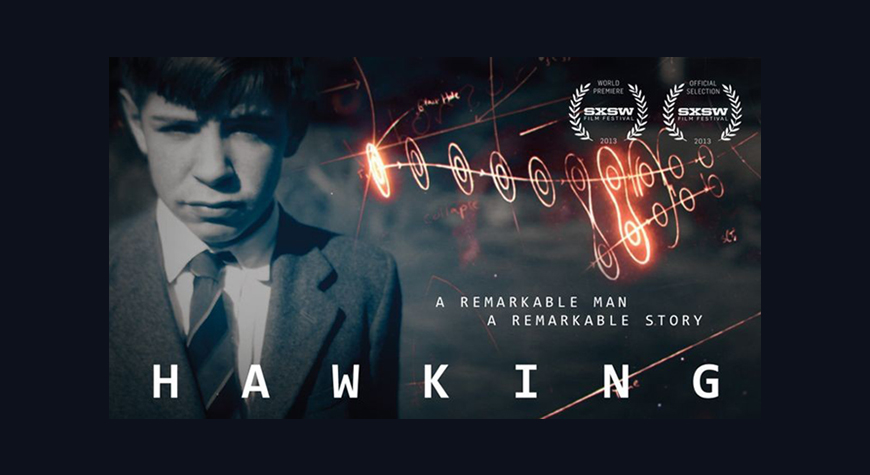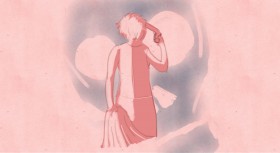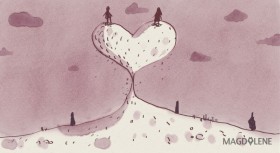Stephen Hawking eating mashed potatoes and drinking champagne. Coping with his illness. Rising to become the most famous cosmologist of our time. You will see these and more in Hawking, a documentary directed by Stephen Finnigan. Dubbed “a personal journal” of the scientist’s life, the film premiered in September at the Cambridge Film Festival.
Told in his own words and by people very close to him, Hawking undoubtedly gives a thorough picture of possibly one of the smartest men alive. It shows how the 71-year old scientist grew up as a bright kid and an extraordinarily intelligent scholar; a fun and eccentric lover; and most importantly, an indefatigable fighter against Amyotrophic Lateral Sclerosis, also known as the Lou Gehrig disease, that has consumed his body for most of his adult life.
The film begins with a scene of Hawking meeting a team of engineers who help him with his voice synthesizer in California in 2012. Finnigan takes the audience to Hawking’s early life, including his Oxford years, during which a sociable Hawking was a member of a rowing team. Through old photos, and dramatized scenes, the film goes on to show his struggle against the degenerative condition that eventually paralyzed him.
Hawking was diagnosed with the motor neuron disease at 21, when he was working on his doctoral degree in Cambridge University in 1963. His doctor told him that he had only two years to live, immediately putting him in depression. But his former wife Jane Wilde turned out to be a savior. He acknowledged that his love to Jane gave him a reason to survive. He then plunged into his thesis about black holes, working hard to finish it before the two-year expiration date forewarned by his doctor, while trying to live life to the fullest.
“Because every day could be my last, I have a desire to make the most of each and every minute,” he says in the film.
Hawking continued his works and went on teaching at the California Institute of Technology (Caltech). By this time wheelchair-bound, he refused initially to employ a caregiver. Before long, however, his condition became worse and he had no choice but to accept help from his students. One of his students, recalls that he didn't think twice when asked to help Hawking. Not only that he would be closer to his professor, but it also meant that he got to stay at Hawking's house for free.
The disease did not spare Hawking's body. Having lost his ability to write, Hawking faced the reality that he was also losing his voice. Sometimes his students helped clarify what he was trying to say when communicating with others, but it soon grew more difficult. He is currently relying on a team of caregivers, who patiently spoon his meal, give him sips of champagne, and wipe his saliva.
Hawking eventually ended his marriage with Jane, and the film only briefly mentions the scientist's second marriage with Elaine, who was his former nurse. In 2006, the two divorced after his family alleged Elaine of having physically and psychologically abused him.
It’s inspiring to see the strength of his willpower and his achievements, when all odds are against him. There were moments of doubts, when Hawking asked himself what he could do with his very limited time. But even when he lost his ability to write equations and speak, he somehow found a way to go on.
I wonder, though, had Hawking not faced the daily “death threat”, would he still have achieved so much and so quickly as he had?
American theoretical physicist Kip Thorne, who also appears in the film, in a way offers an answer to my question in an interview with the Guardian: “Having known him [Hawking] this long, his handicap is pretty irrelevant. In fact, I think his handicap allowed him to do science he may not otherwise have done.”
The film does not only focus on Hawking's career as a scientist. It also touches his personal life with his first wife Jane—the mother of his three children—and his fame. Though the film lacks a more refined cinematic touch, it opens the windows into the life of one of the most fascinating men of science of our time.
Director Finnigan and writer Ben Bowie said during the Question and Answer session at the movie’s premiere at the Cambridge Film Festival, that the three words that would best describe Hawking are: Inspiring, determined, and funny.
I certainly came away from the movie inspired.
Hawking
Director: Stephen Finnigan
Duration: 1 hour 35 minutes
About Anita Rachman
Anita is a journalist who is passionate about books, films, psychoanalysis, and science. She writes fiction and strums her ukulele in her spare time.








Comments